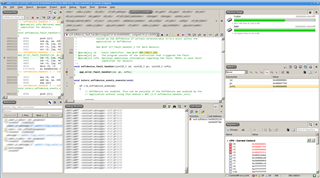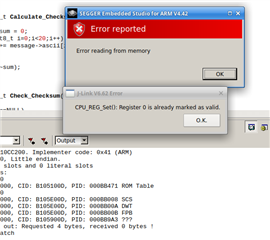I have an application that is running for a while and then it crashes.
Execution goes to softdevice_fault_handler(), calling it with parameters: id=1; pc=0xf764; info=NULL
There is no helpful info in the call stack:

1. Is there a way to track where the crash is coming?
2. Can this be caused by having only 12 bytes of free RAM?
SDH:WARNING:sd_ble_enable: RAM start should be adjusted to 0x20001ff8 SDH:WARNING:RAM size should be adjusted to 0x2008
I get this message when starting up the app, but is doesn't make sense since these are the values that I actually have configured
3. Sometimes I get this error while running in debug mode. It looks like this is just some error with the debugging session. If I attach the debugger again, I can see that the program still running and it doesn't look like it was restarted. Is there a way to avoid the debugging session from going down?

4. Is there a way to release some memory? Maybe removing sections from flash_placement?
<!DOCTYPE Linker_Placement_File>
<Root name="Flash Section Placement">
<MemorySegment name="FLASH" start="$(FLASH_PH_START)" size="$(FLASH_PH_SIZE)">
<ProgramSection load="no" name=".reserved_flash" start="$(FLASH_PH_START)" size="$(FLASH_START)-$(FLASH_PH_START)" />
<ProgramSection alignment="0x100" load="Yes" name=".vectors" start="$(FLASH_START)" />
<ProgramSection alignment="4" load="Yes" name=".init" />
<ProgramSection alignment="4" load="Yes" name=".init_rodata" />
<ProgramSection alignment="4" load="Yes" name=".text" />
<ProgramSection alignment="4" keep="Yes" load="Yes" name=".sdh_soc_observers" inputsections="*(SORT(.sdh_soc_observers*))" address_symbol="__start_sdh_soc_observers" end_symbol="__stop_sdh_soc_observers" />
<ProgramSection alignment="4" keep="Yes" load="Yes" name=".sdh_ble_observers" inputsections="*(SORT(.sdh_ble_observers*))" address_symbol="__start_sdh_ble_observers" end_symbol="__stop_sdh_ble_observers" />
<ProgramSection alignment="4" keep="Yes" load="Yes" name=".pwr_mgmt_data" inputsections="*(SORT(.pwr_mgmt_data*))" address_symbol="__start_pwr_mgmt_data" end_symbol="__stop_pwr_mgmt_data" />
<ProgramSection alignment="4" keep="Yes" load="Yes" name=".log_const_data" inputsections="*(SORT(.log_const_data*))" address_symbol="__start_log_const_data" end_symbol="__stop_log_const_data" />
<ProgramSection alignment="4" keep="Yes" load="Yes" name=".sdh_req_observers" inputsections="*(SORT(.sdh_req_observers*))" address_symbol="__start_sdh_req_observers" end_symbol="__stop_sdh_req_observers" />
<ProgramSection alignment="4" keep="Yes" load="Yes" name=".sdh_state_observers" inputsections="*(SORT(.sdh_state_observers*))" address_symbol="__start_sdh_state_observers" end_symbol="__stop_sdh_state_observers" />
<ProgramSection alignment="4" keep="Yes" load="Yes" name=".sdh_stack_observers" inputsections="*(SORT(.sdh_stack_observers*))" address_symbol="__start_sdh_stack_observers" end_symbol="__stop_sdh_stack_observers" />
<ProgramSection alignment="4" keep="Yes" load="Yes" name=".cli_command" inputsections="*(.cli_command*)" address_symbol="__start_cli_command" end_symbol="__stop_cli_command" />
<ProgramSection alignment="4" keep="Yes" load="No" name=".nrf_sections" address_symbol="__start_nrf_sections" />
<ProgramSection alignment="4" keep="Yes" load="Yes" name=".log_dynamic_data" inputsections="*(SORT(.log_dynamic_data*))" runin=".log_dynamic_data_run"/>
<ProgramSection alignment="4" keep="Yes" load="Yes" name=".fs_data" inputsections="*(.fs_data*)" runin=".fs_data_run"/>
<ProgramSection alignment="4" keep="Yes" load="Yes" name=".cli_sorted_cmd_ptrs" inputsections="*(.cli_sorted_cmd_ptrs*)" runin=".cli_sorted_cmd_ptrs_run"/>
<ProgramSection alignment="4" load="Yes" name=".dtors" />
<ProgramSection alignment="4" load="Yes" name=".ctors" />
<ProgramSection alignment="4" load="Yes" name=".rodata" />
<ProgramSection alignment="4" load="Yes" name=".ARM.exidx" address_symbol="__exidx_start" end_symbol="__exidx_end" />
<ProgramSection alignment="4" load="Yes" runin=".fast_run" name=".fast" />
<ProgramSection alignment="4" load="Yes" runin=".data_run" name=".data" />
<ProgramSection alignment="4" load="Yes" runin=".tdata_run" name=".tdata" />
<ProgramSection alignment="4" load="No" name=".bootloaderSettings" start="0x0003FC00" size="0x400"/>
</MemorySegment>
<MemorySegment name="RAM" start="$(RAM_PH_START)" size="$(RAM_PH_SIZE)">
<ProgramSection load="no" name=".reserved_ram" start="$(RAM_PH_START)" size="$(RAM_START)-$(RAM_PH_START)" />
<ProgramSection alignment="0x100" load="No" name=".vectors_ram" start="$(RAM_START)" address_symbol="__app_ram_start__"/>
<ProgramSection alignment="4" keep="Yes" load="No" name=".nrf_sections_run" address_symbol="__start_nrf_sections_run" />
<ProgramSection alignment="4" keep="Yes" load="No" name=".log_dynamic_data_run" address_symbol="__start_log_dynamic_data" end_symbol="__stop_log_dynamic_data" />
<ProgramSection alignment="4" keep="Yes" load="No" name=".fs_data_run" address_symbol="__start_fs_data" end_symbol="__stop_fs_data" />
<ProgramSection alignment="4" keep="Yes" load="No" name=".cli_sorted_cmd_ptrs_run" address_symbol="__start_cli_sorted_cmd_ptrs" end_symbol="__stop_cli_sorted_cmd_ptrs" />
<ProgramSection alignment="4" keep="Yes" load="No" name=".nrf_sections_run_end" address_symbol="__end_nrf_sections_run" />
<ProgramSection alignment="4" load="No" name=".fast_run" />
<ProgramSection alignment="4" load="No" name=".data_run" />
<ProgramSection alignment="4" load="No" name=".tdata_run" />
<ProgramSection alignment="4" load="No" name=".bss" />
<ProgramSection alignment="4" load="No" name=".tbss" />
<ProgramSection alignment="4" load="No" name=".non_init" />
<ProgramSection alignment="4" size="__HEAPSIZE__" load="No" name=".heap" />
<ProgramSection alignment="8" size="__STACKSIZE__" load="No" place_from_segment_end="Yes" name=".stack" address_symbol="__StackLimit" end_symbol="__StackTop"/>
<ProgramSection alignment="8" size="__STACKSIZE_PROCESS__" load="No" name=".stack_process" />
</MemorySegment>
</Root>
Best regards,
Ricardo


